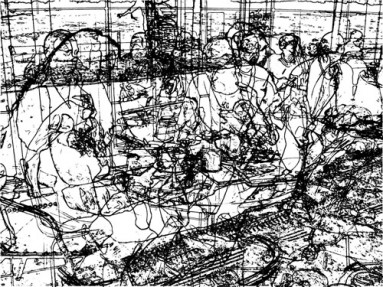The following is a guest post by Elliott Prasse-Freeman.
A group of people from poor backgrounds are found less likely to smoothly interface with the bourgeois world, a lack of interface which could be responsible both for their objective ailments (rise in heart attack) and social problems ("tangles with the law"). Instead of ascribing this to poverty, a lack of experience with symbolic repertories that would allow them to navigate the bourgeois world, and/or concomitant social alienation and suffering that attends both such poverty and social exclusion, Nicholas Kristof in two columns from this year (January and this weekend), presents a ‘scientific’ (read: more real) solution—something called "Toxic Shock Syndrome"—as the variable explaining lagging outcome indicators for children of this demographic. This research, extrapolated from work done on lab rats, presents the underclass body as pathologized due to improper nurturing contact from birth. Kristof uses this as evidence that we should intervene at the level of the poor child’s body:
One successful example of early intervention is home visitation by childcare experts, like those from the Nurse-Family Partnership. This organization sends nurses to visit poor, vulnerable women who are pregnant for the first time. The nurse warns against smoking and alcohol and drug abuse, and later encourages breast-feeding and good nutrition, while coaxing mothers to cuddle their children and read to them. This program continues until the child is 2.
Kristof’s column from this weekend suggests that programs further down the line continue such interventions. But the political context into which this solution is placed actually—as with all Kristof ‘solutions’—militates against fixing the structural problems. In fact, Kristof says so explicitly: “Yet the cycle can be broken, and the implication is that the most cost-effective way to address poverty isn’t necessarily housing vouchers or welfare initiatives or prison-building. Rather, it may be early childhood education and parenting programs” (emphasis mine). His column concludes with the faux-uplifting story of a Chicagoan college student named Kewauna Lerma whose scores have improved, but who remains impoverished: “Kewauna was short on money, and once when she ran out of cash she didn’t eat for two days. But in biology, she earned an A+.” Only someone who believes that education is a blanket panacea in the brutal world of structural inequalities would see this as uplifting. Others could see it outlining the difficulty (if not sheer futility) in making use of that A+ when you don't have enough money to feed yourself. Hence a return to housing and welfare programs as structural interventions that would assist a hugging program would seem essential first steps—but no, hugging is simply all that is necessary for Kristof, before he's off to tell lurid tales of child rape in Other-land.
This is classic Kristof antipolitics, about which much has been written (as it should be; see a recent aggregation here). More important is how this intervention operationalizes a particularly advanced version of paternalistic liberal biopolitics by making biological life itself the object of social programs. The field of social care operates by “eliminating the middleman” so to speak: it imagines social interventions that circumvent the social itself, navigating not only around structural realities (such as punitive drug-enforcement regimes, depleting labor market opportunities), but also messy obstacles like community, family, history, conceptions of the future and opportunity. Critically, this biopolitics ignores its attendant political implications: making the degraded life of the underclass the object for improvement will create social stigma that outstrips both research and any benefits done by teaching the parents and children how to be better bourgeois.
Where class (and of course its intermixing with race in a country where the two correlate due to embedded structural racism) becomes a scientifically-legitimated predictor for social pathologies, it can also become a variable to deny these underclass subjects opportunity to the privileged social world. Given that the welfare state is a thing of the past (if it ever really existed in America at all is certainly debatable), most children will not receive such interventions. What will remain is this residue of knowledge that one form of life is biologically degraded because of its race/class status. Well, we'd like to hire Johnson, but he's from a poor family and hence will do less for our firm. It's just science. I read it in the New York Times.

